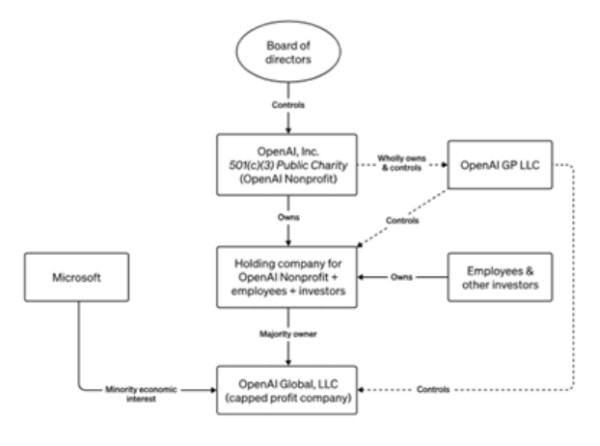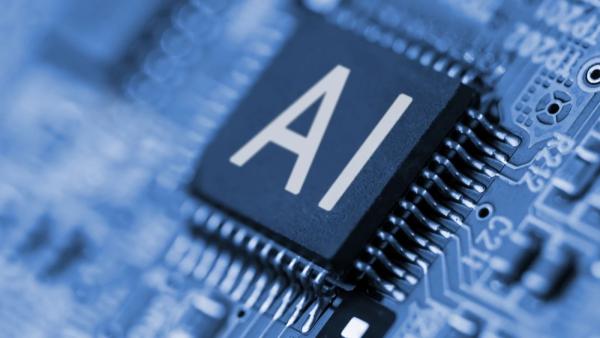The OpenAI saga: what are the lessons learned for directors?
On 17 November 2023, OpenAI's board of directors decided to fire CEO Sam Altman, causing an uproar in the world of artificial intelligence and Silicon Valley. Sam Altman was one of the original founders of OpenAI in 2015. The unannounced dismissal immediately resulted in external and especially internal protest. On Wednesday 22 November, the pressure in all likelihood became too much. Some 90% of the employees threatened to resign in solidarity and demanded the return of the CEO. The workers resigned their trust in the board of directors, which put the directors in an untenable position. And so it happened: Sam Altman returned and the remaining four board members - Adam D'Angelo, Ilya Sutskever, Helen Toner and Tasha McCauley - left.
The question arises how could this have happened? The official statement was that Altman had allegedly not communicated transparently to councillors about the organisation's developments, leading to mistrust and the eventual CEO resignation initiated by councillors.
OpenAI
OpenAI was founded in 2015 as a nonprofit research organisation with the mission "to ensure that artificial general intelligence -- AI systems that are generally smarter than humans -- benefit all of humanity". While the mission remained unchanged, since 2019 the organisation evolved to a hybrid structure of a nonprofit and profit ("capped profit"), with investor returns capped and any additional profits reinvested in the nonprofit objectives. From the beginning, the organisation believed in the potential of AGI (Artificial General Intelligence) to transform society and provide significant benefits, but also recognised the associated risks. Therefore, OpenAI stressed the need for economic mechanisms and governance models anchored in their respective missions and operations.
Initially, in early 2019, the organisation sought to attract donations, but it soon became clear that these investments would not be sufficient to recruit the necessary talent, or to make the huge capital investments in hardware essential to develop their generative AI. Seeing insufficient market opportunities within the public sector and inspired by the success and ambitions of technologically advanced private capital-intensive initiatives such as SpaceX, they decided to raise private funds, with strong commitments to the common good. That was when the first financial backing came from Microsoft which, after further investment in 2023, would gain a 49% shareholding position.(1)

Meanwhile, OpenAI supported other charities with a focus on technology, economic impact and justice, including the Stanford University Artificial Intelligence Index Fund, Black Girls Code, and the ACLU Foundation.
Looking at the structure of the organisation, we see that the for-profit activities of OpenAI Global LLC fall under the parent non-profit organisation OpenAI, Inc, which is at the same time the majority shareholder in the for-profit activity.
Lessons learned for Boards of Directors
By the time we publish this article, you have probably already read Sam Altman's lessons. But what are the lessons learned for directors?
First, we can say that transparent communication is essential within the board, as well as between the board, executive management and shareholders. Within the board of directors, this seems obvious, given collegial decision-making. However, this is not always easy to achieve. Depending on the dynamics within the group, achieving an open discussion culture can be a challenge. To do so, directors need to work on trust within the board, dare to address tensions and be alert to the balance of power. If necessary, the chairman should, on the one hand, take measures that contribute to a climate of trust and openness and, on the other, assume a mediating role in case of conflicts and disagreements. When the council fails to do so, an (external) audit can provide solace in some cases.
Furthermore, communication between the chairman of the board and the CEO plays a crucial role. They need to maintain a good relationship with respect for each other's responsibilities. In addition, the chairman is an important point of contact for shareholders and stakeholders. In the case of OpenAI, Microsoft appeared to be unaware of the problems within the board. So this communication with the various stakeholders, requires attention. Unfortunately, there is no ready-made solution on how to do this. As is often said in governance "one size does not fit all." It is up to the organisation to think about how it will engage stakeholders. To get you started, you will find more concrete tools on how to engage stakeholders in this GUBERNA article.
A second lesson we can draw concerns stakeholder representation. OpenAI Inc's board of directors consisted of only five people: founder-CEO Sam Altman himself, one co-founder Ilya Sutskever, and three non-executive independent board members (Adam D'Angelo, Helen Toner and Tasha McCauley). None of these board members had pronounced financial interests in the now self-proclaimed "capped profit" organisation. Although the organisation's mission statement suggested "a need for governance models appropriate to the organisation's respective missions and operations", it is fair to say that an unsustainable spread between the nonprofit mission of OpenAI Inc. and the for-profit objectives of OpenAI Global LLC was emerging. The board of directors had cited this dispersion and drifting away from the nonprofit objectives as the main reason for CEO Altman's resignation. So the question we can ask is how the organisation can make shareholders or financial interests better represented.
Besides having no financial interests, the organisation may also have lacked directors with the right experience and expertise. OpenAI Inc. had grown rapidly, but the board members, except for the CEO (2), had distinctly technical and/or academic backgrounds. There may be no lack of expertise on AGI, but did the board members have sufficient board experience, financial knowledge and/or corporate governance knowledge? From this we can learn that it is appropriate for the board to check on a regular basis whether the right expertise is present to achieve the set objectives. The results of this analysis can provide guidance when drawing up a clear and formalised selection and appointment procedure, as well as lead to the non-renewal of the mandate of one or more board members.

In turn, this expertise can then be used when evaluating governance structures. In the case of OpenAI, the non-profit structures had not evolved sufficiently with the new "capped profit" approach. It is the task of the board of directors to advise the management in terms of the form of governance and the (long-term) strategy, assess both of these and always keep its finger on the pulse of their implementation. In doing so, it should also monitor management's actions.
We can conclude that the OpenAI saga provides valuable insights for future governance and decision-making and highlights the importance of the board of directors. Want more tips on good governance within the social profit sector? Then be sure to check out our webinars via the following link .
1 Despite large investments, minority shareholder Microsoft did not get a seat on the board of directors of OpenAI Global, LLC. The organisations never provided an explanation for this.
2 In fact, Sam Altman came from the VC world and was the commercial-strategic engine behind the organisation.
